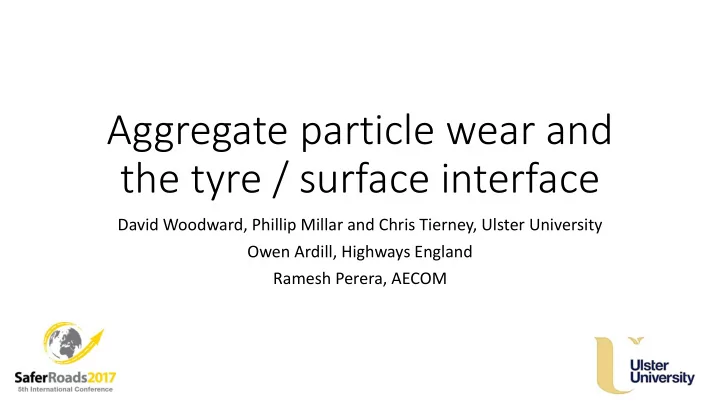

Aggregate particle wear and the tyre / surface interface David Woodward, Phillip Millar and Chris Tierney, Ulster University Owen Ardill, Highways England Ramesh Perera, AECOM
Bradley and Allen (1930) and their sideways force device
Using blue paint to show enveloping
AAV and MDE test methods
Comparison of MDE test gradings
Percentage of aggregate passing the 6.3 mm sieve after MDE testing
Setup for a small fixed slip friction measuring tire
Typical use of a pressure pad
Single frames merged to make a composite contact patch. Merged frames Individual frames
Change in contact pressure distribution for a core due to simulated trafficking
Interface contact
Contact area, length and width for a car tire at different inflation pressures
Contact area and z-axis pressure distribution for SMA10 (flexible pressure pad with individual cell size of 2.54 x 2.54 mm).
3D model of a dirty road surface based on 2 photographs
Comparison of texture depth data using photographs and sand patch
Use of 3D model to evaluate tyre/surface interaction at a depth of 1.20mm
3d model made from photographs taken in France and printed in 2 types of media
Screenshots showing the creation of an idealised worn 10mm SMA surface in CAD
3d printing any type of idealised surface model
Variation in z-axis contact for idealised unworn (merged frames) and worn 10mm SMA rectangular and close packed (single frames)
Comparison of unworn and worn peak pressure distributions
Conclusions • The tire / road surface interface is very complex place. • The paper has brought together two different studies. • They try to compliment each other. • Offer a means most people can understand. • Change in original aggregfate particle size and shape relates to surface texture retention.
Conclusions (2) • 3d modelling based on some photographs gives new ways to visualise things. • 3d printers can create test specimens of: – any road surface anywhere around the world. – any idealised road surface texture. • Flexible pressure pads give real-time measurement of tire / test specimen contact phenomena. • These simple examples illustrate new developing areas of performance prediction.
Recommend
More recommend